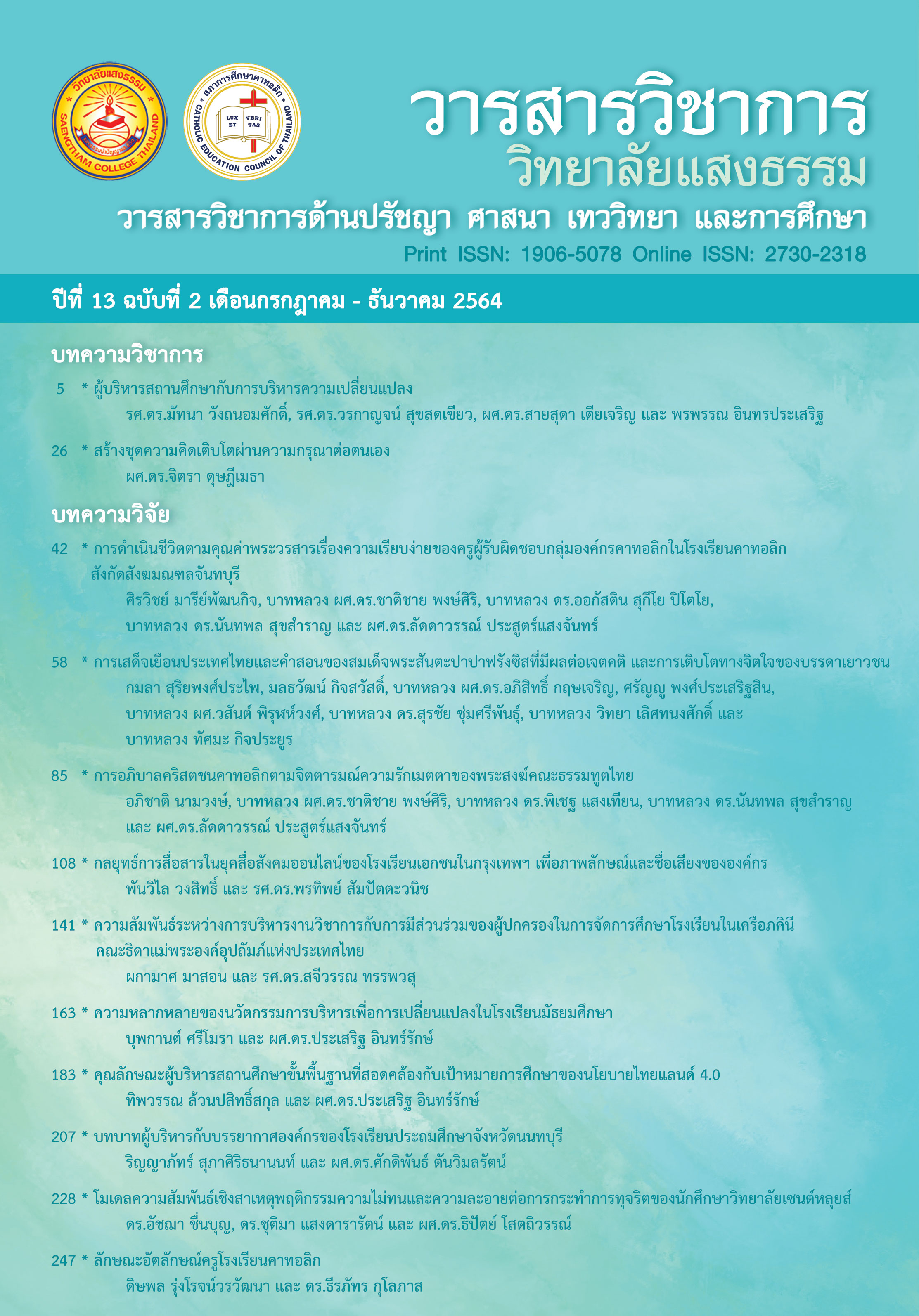Cultivate Growth Mindset via Self-Compassion.
Main Article Content
Abstract
Mindsets reflect one’s perception and belief of the world positively and negatively. Growth mindset refers to one’s belief that intelligence is a changeable trait, that can be developed with effort and perseverance. However, fixed mindset indicates to one’s belief that intelligence is a stable trait. Everyone has both mindsets depending on which mindset is more dominant in that person. This article aims to enhance growth mindset via self-compassion. In general, when one confronts crisis and obstacle, fixed mindset emerges easier than growth mindset. Learning to soothe oneself using three crucial components of self-compassion; common humanity, self-kindness, and mindfulness, one can create more alternatives to overcome fixed mindset and expand more strategies of growth mindset to embrace the benefits of failure.
Article Details
- The academic and research articles, as well as the content and opinions expressed therein, published in Saengtham College Journal are solely the responsibility of the respective author(s).
- Articles published in Saengtham College Journal are the property of Saengtham College. Reproduction, modification, or dissemination of all or part of the content in any form without written permission from Saengtham College is prohibited.
- Articles published in Saengtham College Journal are protected under the Copyright Act.
References
จิตรา ดุษฎีเมธา. (2558). ความกรุณาต่อตนเอง : ทางเลือกใหม่ เพื่อสร้างสมดุลความภาคภูมิใจในตนเอง. วารสารวิจัยและพัฒนาหลักสูตร, 5(1), 26-38
Baumeister, R. (2005). Rethinking self-esteem: Why nonprofits should stop pushing self-esteem and start endorsing self-control. CA: Stanford social Innovation review.
Chen S. (2018). Give yourself a break: the power of self-compassion. Harvard Business Review, 96(5), 116–123.
Curran, T. & Hill, A.P. (2019). Perfectionism is increasing over time: A meta analysis of birth cohort differences from 1989 to 2016. American Psychological Association, 145(4), 410-429.
Dweck, C.S (2016). Mindset: The New Psychology of Success (2nd ed). New York: Random House.
Gollwitzer, P. M. (2011). Mindset Theory of Action Phases. In P. A. M. V. Lange, A. W. Kruglanski, & E. T. Higgins (Eds.), Handbook of Theories of Social Psychology: Volume One (New., pp. 526–546). Los Angeles: Sage Social Psychology Program.
Gunnell, K.E., Mosewich, A.D., McEwen, C.E., Eklund, R.C. & Crocker, P.R.E. (2017). Don't be so hard on yourself! Changes in self-compassion during the first year of university are associated with changes in well-being. Personality and Individual Differences, 2017; (107), 43-48. DOI: 10.1016/j.paid.2016.11.032
Haimovitz, K. & Dweck, C. S. (2016). What Predicts Children’s Fixed and Growth Intelligence Mind-Sets? Not Their Parents Views of Intelligence but Their Parents Views of Failure. Psychological Science, 27(6), 859-869. DOI: 10.1177/0956797616639727
Harvard Medical School. (2021). 4 ways to boost your self-compassion. [Online]. Retrieved: October 1, 2021. Accesed on: https://www.health.harvard.edu/ mental-health/4-ways-to-boost-your-self-compassion
Kemper KJ, Mo X, Khayat R. (2015). Are mindfulness and self-compassion associated with sleep and resilience in health professionals?. Journal Alternative Complementary Medicine, 21(8), 496–503.
Klibert JJ, Langhinrischen-Rohling J, Saito M. (2005). Adaptive and maladaptive aspects of self-oriented versus socially prescribed perfectionism. Journal College Student Development, 46(2), 141-156.
Lemire, F. (2018). Self-compassion. Canadian Family Physician, 64(12), 938.
Lessin, D.S, & Pardo, N.T. (2017). The impact of perfectionism on anxiety and depression. Journal of Psychology and Cognition, 2(1), 78-82.
McGrath DS, Sherry SB, Stewart SH, et al. (2012). Reciprocal relations between self-critical perfectionism and depressive symptoms. Canadian Journal of Behavioural Science, 44(3), 169-181.
Meier, J. D., & Kropp, M. (2010). Getting Results the Agile Way: A Personal Results System for Work and Life. Bellevue, WA: Innovation Playhouse.
Murphy, M.C., & Dweck, C. (2010). A Culture of Genius: How an Organization’s Lay Theory Shapes People’s Cognition, Affect, and Behavior. Personality and Social Psychology Bulletin, 36(3), 283-296.
Neff, K.D. (2003). Self-compassion: An alternative conceptualization of a healthy attitude toward oneself. Self and Identity, 2(2), 85-102.
Neff, K.D. (2011). Self-compassion, self-esteem, and well-being. Social and Personality Compass, 5(1), 1-12.
Rhew, E., Piro, J.S., Goolkasian, P. & Cosentino,P. (2018). The effects of a growth mindset on self-efficacy and motivation. Cogent Education, 5(1), 1492337, DOI: 10.1080/2331186X.2018.1492337
Swann, W.B. (1996). Self-Traps: The elusive quest for high self-esteem. New York: W.H. Freeman.


